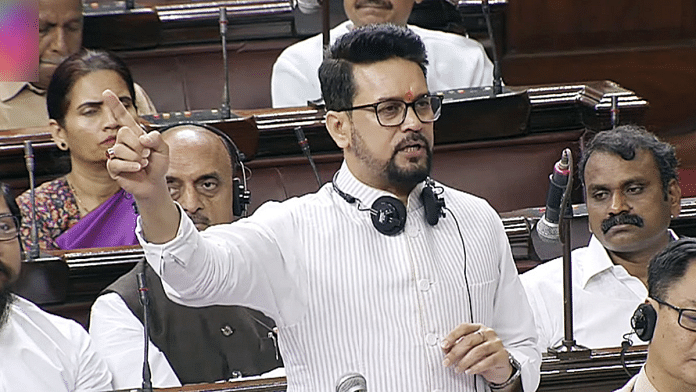New Delhi: The Narendra Modi government has given “more freedom to the press” in stark contrast to the Congress, which inherited a “British” mindset from the former colonial rulers and incarcerated more than 260 senior journalists during the Emergency, Union Information and Broadcasting Minister Anurag Thakur told the Rajya Sabha Thursday.
Thakur was speaking during the debate on the Press and Registration of Periodicals Bill, 2023. The House passed the bill by voice vote minutes later in the absence of the Opposition, which continues to boycott proceedings over the ethnic violence in Manipur.
If passed by both Houses, the legislation — which seeks to ease the process of registering newspapers and periodicals in India — will replace the Press and Registration of Books Act, 1867.
During the debate, Thakur said, “To explain the difference (between the old and the new Act) I wished that the Opposition were also here since they were ruling the country at one point,” he told the House. “Angrez toh chale gaye lekin apni mansikta inko de ke chale gaye (The British may have left, but they gave them their mindset). It was a foreigner who had set up a party that remained in power for many years. It kept working with that (British) mindset.”
He also brought up the Emergency — a time when press freedom was severely restricted and many journalists were incarcerated. The Modi government, he said, has done nothing of that sort.
For context, critics of Prime Minister Narendra Modi’s government have frequently accused the ruling dispensation of having severely curtailed press freedom since it first came to power in 2014.
“A lot of you mentioned the period of Emergency, how (former prime minister) Indira Gandhi’s government — the Congress government — had put over 263 senior journalists in jail,” he said. “I can say today that in the last nine years nothing of that sort has been done by the Indian government. Instead, we have given more freedom to the press.”
Also Read: Twitter’s allegations of govt threats to shut it down an ‘outright lie,’ says deputy IT minister
‘They wanted to even control newsletters’
During the debate, Thakur referred to the Press and Registration of Books and Publications Bill, 2011, which the Congress-led United Progressive Alliance (UPA) had drafted as a replacement for the 1867 act. That bill, however, was eventually referred to a standing committee in January 2012 and never saw the light of day.
The UPA bill, according to Thakur, was fraught with problems and was no different from the law it was seeking to replace.
“It was promoting red-tapism,” he said. “Forget newspapers or magazines, they were about to bring in provisions for registering even college magazines as well. Fortunately, they went away in 2014 and we came in.”
He added that while the British only wanted to control newspapers and magazines, “their successors (the Congress) wanted to control even newsletters”. “What could be more unfortunate?” he asked.
What the bill does
According to its ‘objects and reasons’, the bill seeks to simplify the existing “procedurally cumbersome and complex” act for registering periodicals. The bill seeks to do away with multiple stages for acquiring a certificate of registration and to allow publishers to apply for a registration process online to the Press Registrar General — the apex officer for regulating and monitoring newspapers and periodicals in India — as well as a “specified local authority”.
The proposed law also seeks to do away with the heavy penalties that the old law imposed for small contraventions. Under the existing law, for instance, not printing the name of the publisher and the place of publishing “legibly” can attract a jail term of six months.
In its place, the new bill would impose financial penalties for violations, with the highest being up to Rs 5 lakh for publishing without registration.
The bill also calls for prior approval of the central government for publication of exact reproductions of foreign periodicals in India.
(Edited by Uttara Ramaswamy)
Also Read: 3 reasons why the Modi govt ordered an I-T raid on BBC — none of them makes sense



